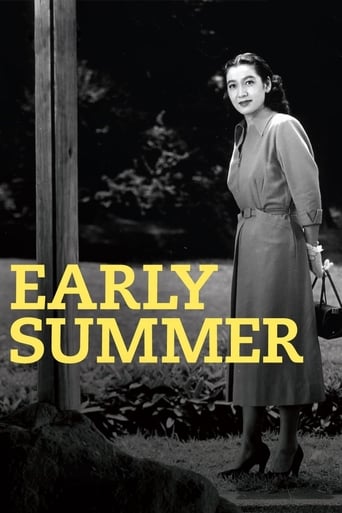paulijcalderon
Ozu's films are never about anything extraordinary or remarkable. They are always very subdued, quiet, calm, genuine and very real. The film follows the life of a Japanese family post WWII. The biggest dilemma that occurs is making sure one of the daughters gets married.The subject matter is interesting. It's a country going through changes and at the same time a lot of men of the daughter's age had died during the war, so the family is starting to lose their patience in finding a husband for her. The tempo is slow and calm. It reflects real life in a good way. The situations are normal and almost every dialogue scene feels like actual conversations and not written. It can be a little too slow for some people, so be ready that the film will take it's time.The emotional core wasn't as strong as in "Tokyo Monogatari". I didn't latch on to the characters that much in this one. So, I wasn't that invested in the middle act, which was the act I thought was the weakest. The opening and ending I thought were the strongest.It makes up for its mistakes with its beautiful setting and locations which are wonderfully captured. The cinematography is really well done and the music is relaxing.
evileyereviews
First things first, this classic burns like incense, slow and wonderful. For those easily bored don't bother. That said, like watching incense burn, the tapestry of our character's existence becomes mesmerizing. This incredible flick is a subtle exposition of Japanese culture as seen through the differing generations that exist under one roof. Even more so, that this occurred during the highly transformation period of Japan at the end of the US occupation demonstrates the rapid evolution of an eastern culture with the contrast between the traditional grandparents, the liberated and business-minded children, and the horribly bratty grandchildren. As the story comes to its denouement, the resultant emotional strife is relegated as inevitable in place of culpability. The story unfolds under the static eye of a beautifully composed camera lens, and the nuances of Japanese culture are elucidated through the brilliance that is routine life. The acting is relaxed and natural, with performances whose genius is hidden in magnified nuance. As well, the beauty of Setsuko, the focal point of Early Summer, becomes almost blinding with each and every smile. Flouting little things such as plot, this story is nonetheless riveting and is a treat to watch. Ozu's direction is inspirational through his uniquely static poetry of the screen.Evil Eye Reviews
brendastern
I had seen Tokyo Story and respected it. But Early Summer is a charming, poignant and very human movie that stands the test of time. It is the story of Noriko, a 28-year-old administrative assistant who is under pressure from her family to marry. To put this in perspective, in traditional Japan, a woman married by age 25, or she was considered a "Christmas cake "-- nobody wanted it after the 25th! It is not as common in Japan now for women to face such pressure, especially since so many Japanese women are choosing to stay single, now that they have the money to be independent. However, Noriko's case would have been common up until the current generation of women.While the war is not a character in the movie, there are threads that connect Early Summer to World War II. The movie takes place in 1951, just before Japan emerged from the U.S. occupation, and before Japanese society had its great explosion of wealth in the 1960s. It is a snapshot of a time that no longer exists, although the family conflicts are universal. I plan to add Early Summer to my list of top movies and look forward to viewing it again.
Tashtago
The style and pacing of Bakushu is similar to Tokyo Story but unlike the latter, Bakushu's central theme of arranged marriage over individual choice seems awfully dated and for this reason the film does not rank as highly as Tokyo Story. At the end of Tokyo Story both my wife and I felt compelled to examine our relationship(s) with our respective parents. The theme of Tokyo Story (sons and daughters relating to aging parents) is much more universal and therefore much easier to identify cross-culturally. Although the concern the entire family shows for the daughter Noriko's marriage may seem unusual to western viewers it is still very much a reality in many parts of Japan. Once this can be realized or accepted then Bakushu can take on the same poetic beauty that can be found in all of Ozu's work. The cinematic style is another thing altogether and may take a lot of getting used to as will the sure volume of characters which is probably five times as many as can be found in most western films. Ozu bears repeated viewing as his subtlety and outrageously awkward camera placements are an acquired taste but for those who persevere there are many rewards.


 AD
AD



